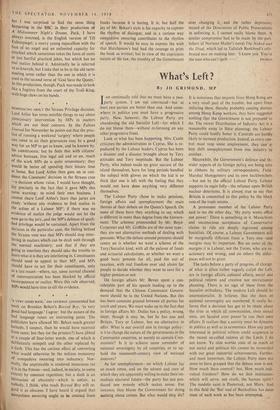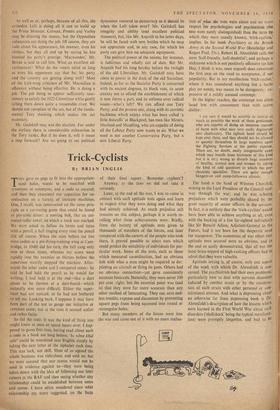What's Left?
By JO GRIMOND, MP T AM continually told that we must have a two- 'party system. I am not convinced—but at least two parties are better than one. And some- where in politics you must have a progressive party. Now, however, the Labour Party are abandoning the old Socialist Left—for which I do not blame them—without re-forming on any other progressive front.
Look at what has been happening. Mrs. Castle criticises the administration in Cyprus. She is re- pudiated by the Labour leaders. Cyprus has been a disaster and a disaster brought about by Tory attitudes and Tory ineptitude. But the Labour Party, who indeed made no great success of the island themselves, have for long periods handled the subject with gloves on which the kid is so thick that one is left with the feeling that they would not have done anything very different themselves. • The Labour Party 'chose to make pensions, foreign affairs and unemployment the main themes of their debate on the Queen's Speech. On none of these have they anything to say which is different in more than degree from the Govern- ment. The schemes propounded by Mr. Boyd- Carpenter and Mr. Griffiths are of the same type : they are not alternative methods of dealing with pensions. What the debate around pensions should centre on is whether we want a scheme of the Tory/Socialist kind, with all the palaver of funds and actuarial calculations, or whether we want a good basic pension for all, paid for out of taxation, with real freedom over and above for people to decide whether they want to save for a higher pension or not.
On foreign affairs Mr. Bevan spent a con- siderable part of his speech leading up to the demand that the Chinese Communist Govern- ment should be in the United Nations. But this has been common ground between all parties for years and years. We must wake up to the fact that in foreign affairs Mr. Dulles has a policy, wrong, inept, though it may be, but he has one and Britain, Tory or Labour, has no alternative to offer. What is our overall aim in foreign policy : is it to change the nature of the governments in the Communist countries, or merely to contain Com- munism? Is it to achieve some surrender of national sovereignty by ell countries, or to up- hold the nineteenth-century view of national interests?
As for unemployment—on which Labour lay so much stress, and on the advent and cure of which they are apparently willing to stake their im- mediate electoral future—the party has not pro- duced one remedy which makes sense. For instance, they blame the Government for doing nothing about cotton. But what would they do? It is notorious that imports from Hong Kong are a very small part of the trouble; but apart from reducing them, thereby probably causing distress among Hong Kong workers, they have suggested nothing that the Government is not prepared to do. The recent Distribution of Industry Act is a reasonable essay in State planning; the Labour Party could hardly better it. Controls are hardly likely to increase production. Indeed, as every con- trol must stop some employment, they can at best shift unemployment from one industry to another.
Meanwhile, the Government's defence and the wider aspects of its foreign policy are being torn to ribbons by military correspondents, Field- Marshal Montgomery and its own backbenchers —but not by the official Labour Party. Labour supports its main folly—the reliance upon British nuclear deterrents. It is almost true to say that Britain is committed to this policy by the block vote of the trade unions.
A prominent member of the Labour Party said to me the other day, 'My party wants office not power.' There is something in it. Masochism and unconscious acceptance of Conservative claims to rule are deeply ingrained among Socialists. Of course, a Labour Government will be marginally different from a Tory one—and margins may be important. But on some of the margins it is Labour, not the Tories, who are re- actionary and wrong; and on others the differ- ences will not be great.
The tasks before a party of progress, of change, of what is often rather vaguely called the Left. are in foreign affairs, colonial affairs, social and political reform and creative not restrictionist planning. There is no sign of these from the Socialist orthodoxy. The modern Left should be internationalist. It believes that the days of national sovereignty are numbered. It really be- lieves that a decision has got to be made about the time at which all communities, even mixed ones, are handed over power to run their own affairs. It realises that a society must be dynamic in politics as well as in economics. How any party interested in political reform could acquiesce- in the recent so-called reform of the Lords I do not know. Ye olde worlde state of so much of our social and political life cannot be reconciled with our great industrial achievements. Further, and most important, the Labour. Party does not seem to have grasped that the debate now is not, How much State control? but, How much indi- vidual freedom? How do we find institutions which will serve, not crush, the human spirit? The modern saint is Pasternak, not Marx. And in this field the 'But' end of Butskellism has done most of such work as has been attempted. As welt as or, perhaps, because of all this, the orthodox Left is doing all it can to build up the Prime Minister. Colman, Prentis and Varley may be drawing the money, but the Opposition columnists are doing the job. Of course, they are rude about his appearance, his manner, even his clothes, but they all end up by saying he has boosted his party's prestige. 'Macwonder,' Mr. Bevan is said to call him. What an excellent ad- vertisement! What do the voters mind so long as even his opponents say that he, his party and the country are getting along well? Most of the Left-wing criticism of Mr. Macmillan is offensive without being effective. He is doing a job. The job being to appear sufficiently reac- tionary to satisfy the 1922 Committee while gently selling them down quite a reasonable river. We should not complain of the act, but of the funda- mental Tory thinking which makes the act necessary.
Mr. Gaitskell may win the election. For under the surface there is considerable exhaustion in the Tory ranks. But if he does it, will it mean a step forward? Are we going to see political dynamism restored to democracy as it should be when the Left takes over? Mr. Gaitskell has integrity and ability (and excellent political manners), but, like Mr. Asquith in his latter days, he will be faced with new battles which he may not appreciate and, in any case, for which his party can give him no adequate equipment.
The political power of the unions, for instance, is ludicrous and wholly out of date. But Mr. Asquith had his long heyday before the twilight of the old Liberalism. Mr. Gaitskell may have come to power in the dusk of the old Socialism. Indeed, as far as the Socialist Party is concerned with its ancient dogmas, its block vote, its acute ,anxiety not to offend the establishment of which it now forms a part, and its softness over radical issues—what's left? We can afford one Tory Party; and the present one, along with its atavistic backbone which enjoys what has been called 'a little fisticuffs' at Blackpool, has men like Messrs. Macleod and Maudling, who are capable of doing all the Labour Party now wants to do. What we need is not another Conservative Party, but a new Liberal Party.







































 Previous page
Previous page